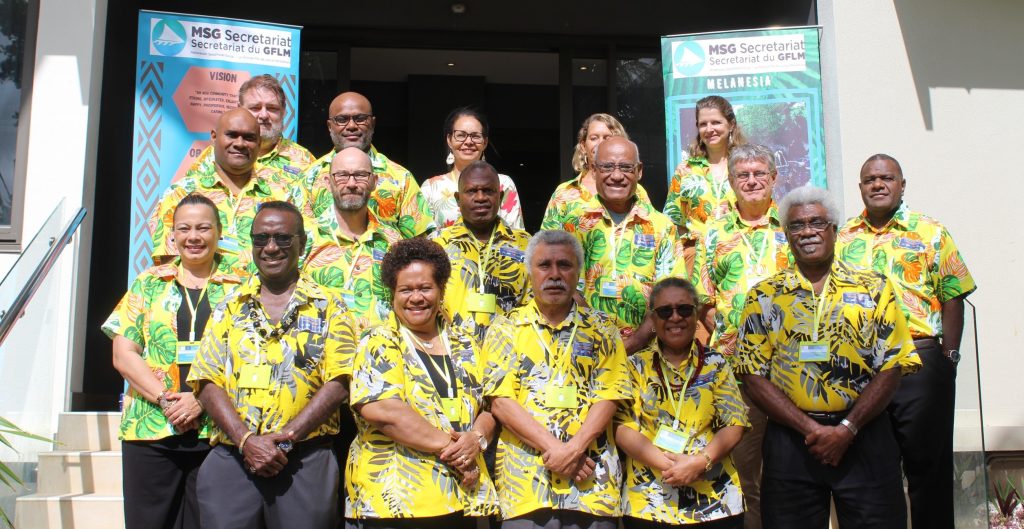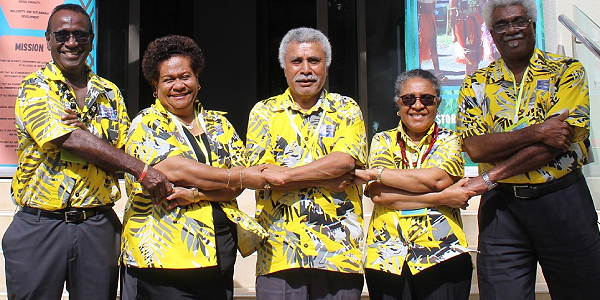By Ana Tudrau-Tamani*
MSG Secretariat
MELANESIAN National Universities can play a significant role in framing the right conversations and narratives for appropriate security policy decisions in response to the heightened militarization of our region as a result of intense geo-political posturing.
This is one of the many motivations behind convening the inaugural Melanesian Spearhead Group (MSG) Vice Chancellors meeting held recently by the MSG Secretariat in Port Vila, Vanuatu.
Other reasonings include the possibility of preferential fee levels for MSG citizens in our MSG National Universities, mutual recognition agreements for qualifications, enabling labour mobility of our people between the MSG countries, the promotion and protection of our Melanesian culture and languages, and the need for a vibrant visiting lectureship program and sharing of curricula amongst MSG Universities, to cultivate the spirit of unity of purpose for Melanesia.
In addition, the Director General of the MSG Secretariat, Leonard Louma, saw not only the need to introduce a robust Student Exchange Program to engender Melanesian fraternity and a feeling of togetherness in our universities, but also the role that MSG Universities can play in a paradigm shift towards maximising traditional mechanisms to address challenges.
An apparent issue that resonated throughout the two-day meeting was the need to collaborate and strengthen partnerships amongst our MSG Universities.
The meeting was attended by Professor Unaisi Baba, Vice Chancellor of the Fiji National University (FNU); Dr Cecilia Nembou, Acting Vice Chancellor of the University of Papua New Guinea (UPNG); Dr Transform Aqorau, Vice Chancellor of the Solomon Islands National University (SINU); and chaired by the Vice Chancellor of the National University of Vanuatu (NUV), Jean Pierre Nirua, by virtue of Vanuatu being the current Chair of the MSG.
Deputy Secretary General of the Pacific Islands Forum (PIFS), Esala Nayasi, and Regional Director for Melanesia of the Secretariat of the Pacific Community (SPC), Ms Sarah Mecartney, were invited as Special Guests.
In his opening statement, the Chair and Vice Chancellor of NUV, Mr Nirua stated that this is the very first meeting of the Vice Chancellors of the MSG National Universities and underscored the fact that the forum is important for exchanging views and experiences. As well to ascertain how MSG National Universities can play a constructive supportive role to the efforts of MSG National Governments in attaining the objectives of prosperity, happiness, and security for our people.
Director General Louma, in his opening remarks said the meeting was intended to kick-start, at the MSG level, “a process of identifying potential areas of collaboration, cooperation, coordination, harmonisation, and integration amongst the MSG National Universities. It also provides a platform for identifying gaps in cooperation currently undertaken under the ambit of Pacific Islands Universities Regional Network, or cooperative arrangements that you yourselves have already entered into, and determining areas where MSG National Universities, as a collective, might add value to those partnership arrangements in the pursuit of specific MSG interests in the higher education space”.
While the initiative is part of MSG’s efforts towards achieving the objectives of Pacific Regionalism as envisaged under the 2050 Strategy for the Blue Pacific, MSG will be the foundation and the building block for Pacific Regionalism.
“At the risk of over-emphasising the significance of the MSG in Pacific Regionalism endeavors, let me repeat what I have proudly claimed on so many occasions. Excluding calculations for Australia and New Zealand in the PIF, MSG countries constitute 98% of the land area, 86% of the population, 91% of the GDP, over 90% of the natural resources, and almost half the EEZ (approximately 8.5 million square kilometers),” he said.

This critical mass that MSG countries provide in the region, he stated, imposes on the MSG an obligation to be at the forefront of regional initiatives concerning coordination and collaboration of efforts between, and amongst, our countries and institutions.
DG Louma emphasised the importance of this meeting to foster cooperation for education excellence in the region, adding that this is part of a series of actions the MSG Secretariat is undertaking to explore options for strengthening cooperation in key areas such as security, fisheries, forestry, environment, economic and trade, judiciary and parliamentary.
The meeting recognised the need for innovative actions such as integrating TVET into the main higher educational system, contextualizing research, living lab teaching and learning, and the importance of working together to foster and strengthen partnerships through initiatives such as integrating language and culture into higher education curriculum; and the establishment of an endowment fund as part of resource mobilization to be accessed for joint collaborative work of the MSG National Universities, among others.
With regards to the role of MSG Universities in Security and Development, the meeting recommended the need for establishing a Melanesian Institute of Peace and Security Studies (MIPSS). It also agreed for the need to create an MSG Institute of Island Futures/Climate Finance (MIIFCF) for Research and Policy Development for MSG. These two proposals, and others, will be brought to the attention of the MSG Leaders at their next meeting.
Solomon Island National University’s Dr Aqorau believes that MSG National Universities have huge opportunities by partnership with others, particularly with regard to policy work. His colleague Dr Nembou of the University of Papua New Guinea commented that national universities must consider quality assurances and resource mobilization such as an endowment fund. Dr Unaisi of the Fiji National University describes the occasion as a momentous one where they gathered to discuss and collaborate on ways to enhance and strengthen higher education in the MSG region through the national universities.
PIFS Deputy Director General Esala Nayasi reiterated the important role played by MSG in the subregional and regional space, adding that collaboration and integration need to be achieved, with a clear identification of how the MSG National Universities can work together to deliver the 2050 Strategy for the Blue Pacific Continent.
He said that while there are gaps in policy that need to be aligned within the context of countries and communities, the linkages between regional, sub-regional, national, and sub-national policy need to be bridged and alignments strengthened to address the region’s challenges.
He notes that there are also gaps between regional and national institutions, including academia, that provide services to the people in the Pacific, and these gaps need to be identified and addressed holistically.
SPC Director for Melanesia, Mrs Sarah Mecartney said the SPC places great value on the role that universities play in investing in the future of the region through education and learning. This meeting is an important avenue for thought leadership as a catalyst for change in the Melanesian subregion and the Pacific.
DG Louma has assured the Vice Chancellors of his commitment to progress the meeting recommendations to the MSG Governing Bodies for approval.
The next meeting will be hosted by the Fiji National University next year.
*Mrs Tamani works at the MSG Secretariat in the area of Media & Communications









